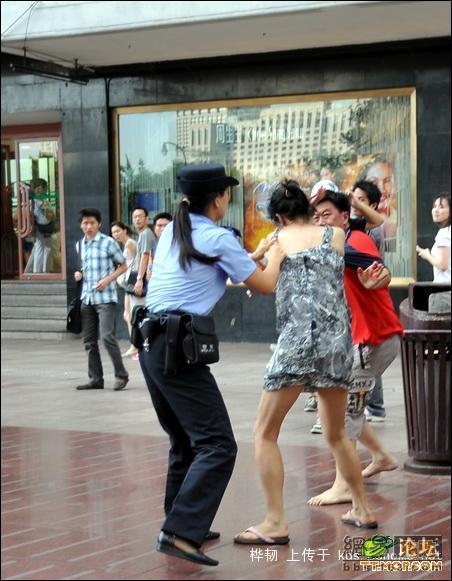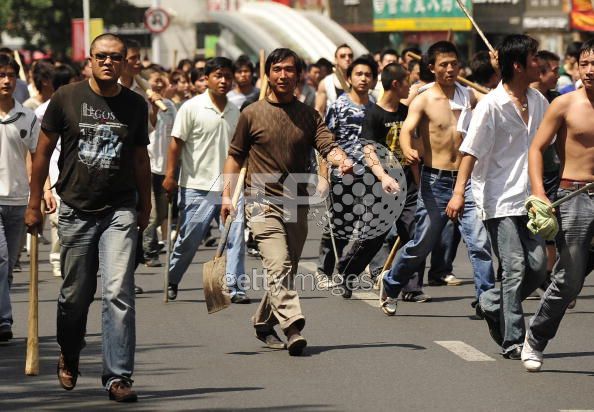Society
- Details
- By David Cao
- Hits: 1137
Before reported : Hans suffered serious casualties in Uigur's violence (photos)
As an Iraqi Muslim who has visited China, I was so shocked and sad when I read reports of the July 5 violence in China's Xinjiang province, especially when I learned from the Western media of clashes between the Han Chinese and Uygurs, and government troops cracking down on the Uygurs.
I could not believe it, not from my experience in China.
So I immediately contacted my friends in China, from whom I learned that the reports by the Western media were purposely biased and to a certain extent, politically motivated -- just as their versions of the US occupation in Iraq.
I have been to China twice -- first for a visit of two weeks, and then for a year's stay, from August 2006 to August 2007. During my visits, I was impressed by the way China's 56 ethnic groups, with Hans in the majority, live peacefully together and religious freedom respected.
When I was in Beijing, I prayed every Friday at a mosque at Niujie, a Muslim-dominated district in the Chinese capital.
As an Iraqi, whose country at the time was suffering from daily explosions, shootings and kidnappings, I remember I was often touched by the good wishes extended to me by complete strangers, among them Han people who visited the mosque, which has a history of more than 1,000 years.
During my time living and working among the majority Han Chinese in Beijing, I found no difficulty performing my Islamic rituals, neither did I notice any untoward incidents against Muslims in China, including the Uygurs.
I met many Chinese Muslims, who were really proud of being Chinese citizens.
I remember a small Chinese restaurant in Niujie, owned by a Uygur Chinese, which I frequented for its Islamic food and music.
I noticed TV programs in the restaurant were in the Uygur language, and when I inquired about it, one young man, who said he was studying at an Islamic institute, answered in Arabic "we have television stations in Xinjiang that use our language, which is backed by the central government."
Today, I still remember the Chinese pilgrims I met who went to Mecca for the Hajj (pilgrimage), in Saudi Arabia. They often wore jackets with a Chinese flag stitched on, and under the flag were words in Arabic -- "Chinese Hajj" or Chinese pilgrim, and I could feel their sense of being proud Chinese Muslims.
Once I tried to joke with one of the pilgrims and asked through a translator, "can you give me this jacket, so that I can show it to my folks in Iraq that this is a gift from my Chinese friend?"
He smiled and said: "I can buy you a new one, but I will have to keep this one, as I have worn it for years and I am proud to have this flag on my chest."
Islam is the second biggest religion in China, next to Buddhism. As far as I know, there are some 30,000 mosques in China, including 70 in Beijing.
Outside the capital, religious freedom is well respected as well. When I went to Henan province for a vacation, I witnessed Islamic lectures being held frequently at major mosques, and Muslims living peacefully and happily.
Muslims and other minorities in China enjoy exceptional privileges. My Chinese Muslim friends told me that, like other minority groups, they are not bound by the one-child-policy.
Muslims and other minorities are also accepted at lower qualifications to colleges and universities; and minorities like the Uygur and Hui are well represented in governments at all levels.
So when people say that the July 5 violence occurred because the Uygurs felt discriminated by the majority Hans, I really cannot believe it. I have personally witnessed how well Muslims and Han Chinese get along.
One day while sitting in the yard of the Niujie mosque, I met a young man who I later learned was an Egyptian. Named Ahmed, he had come to Beijing to marry a Han Chinese girl who he met in Cairo while she was studying there.
But according to religious ritual, a non-Muslim girl or man cannot marry a Muslim unless he or she converts to Islam.
A week later, when I met Ahmed again he told me that his dream had come true, the girl had decided to convert to Islam.
She had met no objections from her family. Within a week she was issued a certificate by the mosque confirming that she was now a Muslim.
I also have a female friend in Beijing, a Han Chinese, who is married to a Hui Muslim. They have a happy family.
Today, when I see pictures of the bloody clashes in Xinjiang, it reminds me of what is happening here in Baghdad.
I feel outraged as I witness the media repeating what they did in Iraq -- inciting internal conflict to serve certain agendas.
My country has been suffering from foreign interference and domestic violence for more than six years. With the war, and the sectarian conflicts, our once prosperous country is now in ruins.
The sectarian strife has been largely fanned by foreign powers to alienate Iraq's Sunnis, Shiites and Kurds, and the United States once even had a "separation-of-Iraq-into-three" scheme high on its agenda.
What have ordinary Iraqis received -- be they Sunnis, Shiites, or Kurds? Nothing. Nothing but devastation, displacement and the loss of lives of innocent people. My son, Omar, was injured by a roadside bomb in October 2007. He was only 12 years old at the time.
I call on the people to cool down and consider the whole picture: see what has happened in Iraq. Do not let yourself be fooled by those who try to undermine the security and stability of China by trying to destroy the peaceful co-existence of its ethnic groups.
- Details
- By David Cao
- Hits: 908

Nanjing Road, Shanghai, a callet is attacking a man fearlessly.
That shows the spirit of sexual equality spreads well in the entire country. It's not a show or performance art.
- Details
- By Chinadaily.com.cn
- Hits: 868
A suspected murderer, on the run for 15 years, was arrested on Monday, years after he visited relatives and bragged that he committed a homicide in Wuhan, Hubei province.
The suspect was on the police wanted list for the 1994 crime.
He returned to Wuhan two years ago because he missed his family members. He became relaxed recently and started boasting to friends and relatives.
He was detained when one of his friends told police.
- Details
- By Bbc.com.uk
- Hits: 1787

If you check the gallery below, then you can understand why the Hans are going crazy
Xinhua news agency said police restored order after demonstrators attacked passers-by and set fire to vehicles.
Xinhua did not say how many people were involved or what their motive was.
But activists and eyewitnesses said that those involved in the unrest were minority Muslim Uighurs. An overnight curfew has been declared.
Xinjiang is home to about eight million Uighurs, some of whom want independence.
"It started as a few hundred, and then there were easily over 1,000 involved," one unidentified eyewitness told Reuters news agency.
Adam Grode, an American national studying in Urumqi, said he has seen protesters knocking over police barriers and smashing bus windows.
Read more: Hans suffered serious casualties in Uigur's violence (photos)
- Details
- By Bbc.co.uk
- Hits: 948
China is to delay a controversial plan requiring all new computers sold in the country to be equipped with an internet filtering software, state media says.
The filter, called Green Dam Youth Escort, was to have been required from Wednesday, but the industry ministry said computer makers needed more time.
Its planned rollout sparked widespread disapproval inside China, legal challenges and criticism from overseas.
Officials say it is designed to shield children from pornography and violence.
However, free speech activists have criticised the software plan as an attempt to tighten the Chinese government's already strict controls on internet usage.
A report by China's official Xinhua news agency gave no other details on the decision by the Ministry of Industry and Information Technology.
Virus risks
The BBC's Quentin Sommerville, in Beijing, says the reversal is a very rare and embarrassing climbdown for the Chinese government.
Chinese internet users already endure one of the most heavily-censored and politically-controlled internets in the world, our correspondent says, and were furious about this additional control.
Foreign governments have complained that the new software could break trade rules, and concerns have been raised about its effectiveness and safety.
Tests carried out on Green Dam outside China indicated that it left personal computers open to many different security risks, including virus attacks.
Our correspondent says that despite the government's strict controls over internet usage in China, the country does have a vibrant internet culture.
Some people do manage to get around the controls, he says, and criticism of the Communist Party government is available online, even if political opposition is formally banned.
More Articles …
Page 213 of 255